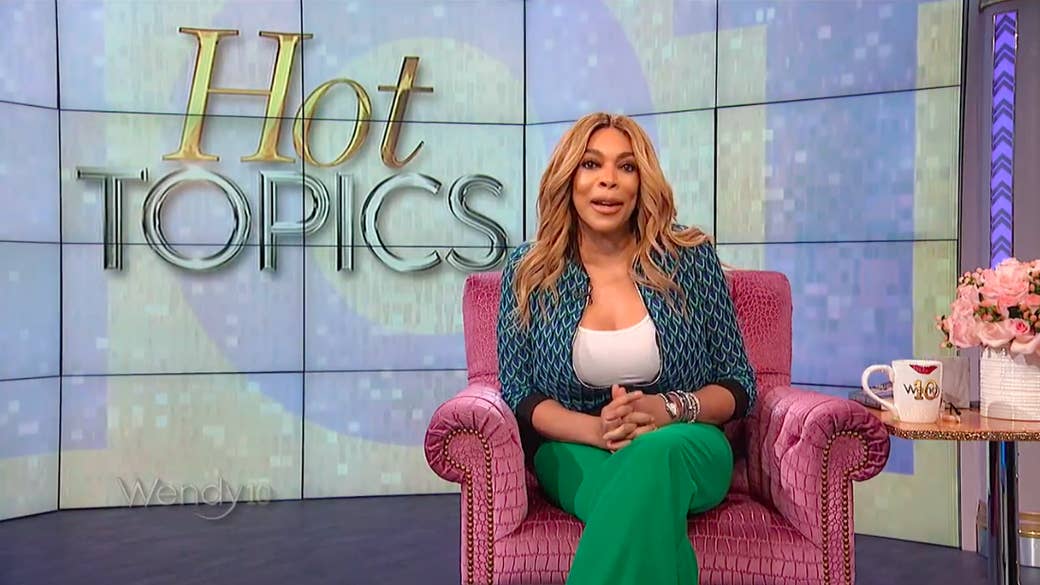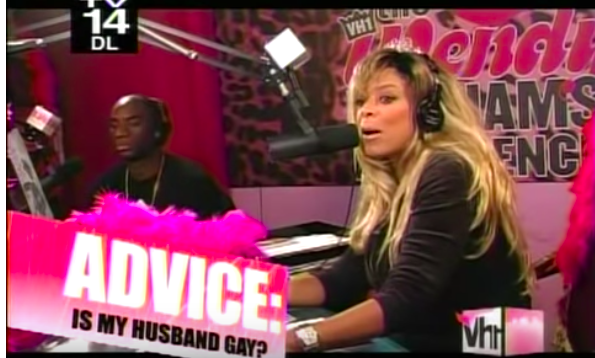
Chatting with CNN personality Van Jones on her show last Tuesday, Wendy Williams was in trademark tell-it-like-it-is, heat-seeking form. Jones was there to promote a new show, and as the interview was winding down, Williams asked about his ongoing divorce from his wife. “You still wear your ring,” she noted, gesturing toward his left hand. “And you got something on your hand too,” he shot back, laughing, “so I ain’t talking about that.”
“No, this isn’t…” she trailed off, looking uncharacteristically flustered amid a boisterous audience. “I’m just saying,” he interrupted sheepishly, “ …we can talk about your man.”
Jones was specifically referring to Williams’ ongoing tabloid-ready divorce drama with her husband, Kevin Hunter. The exchange, written up in Page Six, broadly highlighted the uncomfortable position she’s found herself in as she’s become the kind of scandal-plagued celebrity that she usually focuses on during her talk show musings.
In September 2017, the Daily Mail published the results of a multiyear investigation, alleging that Williams’ husband had been leading a double life with a “mistress” for over a decade. One month later, Williams passed out on live television, wearing a Statue of Liberty Halloween costume. The surreal, thoroughly memed moment, opened the floodgates to a stream of stories about her personal life that threatened to overtake any of the celebrity stories that make up her “Hot Topics” pop culture commentary segment.
Then, in early 2018, Williams revealed that she had been diagnosed with Graves’ disease, and that doctors had ordered her to take three weeks off from the show. She never addressed the tabloid news about her husband’s affair, and some gossip sites expressed skepticism about the timing of her diagnosis announcement.
The rumors continued when she embarked on an unprecedented planned two-month leave of absence in January, replaced by a number of fill-in hosts — including Nick Cannon, Sherri Shepherd, and Jerry O’Connell. Her staff leaked requests for producers to permanently replace her: “How can she discuss Hot Topics when the biggest topic is her cheating husband?” asked one anonymous staffer in the Daily Mail.
Right before it was enveloped by Williams’ own scandal, the show celebrated its 10th year, and since Williams’ March 4 return she has slowly started telling her story on her terms. By addressing her audience — sometimes directly, sometimes nudged by her own guests — she has finally been letting viewers into her personal life, showcasing the savvy that makes her such a compelling broadcast personality, and highlighting exactly why — love her or hate her — she’s stayed on our television screens for over a decade.
It’s not easy being a woman of daytime — which requires a host to be both approachable and authentic for an audience of predominantly women. This balancing act is especially complicated for Williams. So many of the women who have succeeded in daytime — Oprah, Rosie, Ellen, Kelly Ripa, Rachael Ray — have done so by playing sanitized, uplifting versions of themselves.
But Williams is less a relatable mom than a messy, gossipy aunt. One of her catchphrases, “Say it like you mean it!” — which she performs with gusto when a guest wavers about revealing some juicy nugget — captures the way her appeal relies on honesty. But it’s a kind of truth-telling wrapped in gossip rather than self-help bromides. “I don’t get political,” she said while accepting an award for her work last October, “and I don’t do human-interest stories where people are coming in and we’re crying together.”
It’s true that Williams has never been interested in playing America’s nurturing, motherly confessor. She’s a contradictory, polarizing figure, but that’s part of why her fans love her, and what sets her apart from the blandness of most daytime television. She’s controversial, and often traffics in a gendered and racial conservatism: She has spoken out against #MeToo and the women who have leveled sexual assault allegations at R. Kelly , and recently claimed Jackson’s alleged victims were lying. And during the Van Jones episode, she pushed back against his arguments against mass incarceration, saying, “Every killer doesn’t need to be redeemed.”

Her persona was originally crafted on radio, outside television’s constraints. She first became famous as a “shock jockette” on New York City radio, Kiss FM and Hot 97, just as hip-hop was turning into a dominant pop cultural force. Her gossipy (often unfounded and problematic) insinuations about rappers’ sexuality earned her many enemies in that world — perhaps most famously at the time, Puff Daddy. Her other famous catchphrase, which has since become synonymous with the TV show — “How you doin’?” — comes from her radio days, and was meant to elliptically hint at these kinds of rumors.
But Williams was also radically honest about her own life with her radio audience: She talked about her miscarriages, her weight and self-image, plastic surgery, and her struggles with cocaine addiction. She is rarely given credit for expanding representations of black femininity, but before Love & Hip-Hop and Real Housewives of Atlanta, she was making her one-woman brand of drama and “scandalosity” mainstream performance art. As she put it in Wendy’s Got the Heat, her 2003 New York Times best-selling memoir, she refused to be “anyone’s sidekick.” (Itself perhaps a shady but loving reference to Howard Stern’s cohost Robin Quivers).
Williams is less a relatable mom than a messy, gossipy aunt.
Women and gay men love her combination of moxie and vulnerable candor, and the contradictions of her self-described more-is-more exterior (she’s said she’d be a drag queen if she were a man) and her desire to be a nice suburban New Jersey girl. “I’m still managing to be traditional,” Wendy told New York magazine in 2005, some years after her marriage to Hunter and the birth of her son. “You know, the kid, the husband, the house, the morals.”
Since the summer of 2008, when Williams brought her radio show to television, she’s become a bigger star than ever. Anderson Cooper, Bethenny Frankel, Katie Couric, and Meredith Vieira all had their daytime talk shows flop in the time Williams has been on the air. Unlike most other shows, a lot of the material — and press about — the hourlong program comes not from celebrity interviews, but from her signature, opinionated pop culture commentary during her “Hot Topics” segment that opens the show.
She moralizes, prescribes, and needles celebrities — ranging from C-list reality television stars to the Kardashians and Beyoncé — giving her hot takes on all the day’s news. “Hot Topics” is now over 20 minutes long, and takes up almost half of the hourlong show; it is synonymous with her brand. And this is part of why her current situation has presented such a dilemma. It feels hypocritical to chatter about — and perhaps even relish in — other people’s drama while her own life seems to be falling apart.
Last year, Big Brother host Julie Chen had to leave her morning show The Talk. The allegations against her husband, CBS head Les Moonves, were exactly the kind of news — bridging human interest, celebrity, and the personal as political — that provides daily fodder on daytime gab fests, so it wouldn’t have made sense for Chen to remain. She never went back to the show after the allegations became public. (Incidentally, Williams’ husband was also accused of sexual harassment in the past, before she became a daytime television star.) As Williams now knows, it’s tricky to keep a personal scandal off-limits when you’re a daytime host.
From the moment the Daily Mail story broke into the gossip columns in 2017, Williams refused to address her situation. In December 2018, when the tabloids revealed her husband was expecting a baby with his girlfriend, Williams was slurring her words on the show. She apologized to viewers in an Instagram post afterward, but mentioned nothing about her personal life before she went on a two-month hiatus, which kept getting extended, ultimately through March.
It feels hypocritical to chatter about — and perhaps even relish in — other people’s drama while her own life seems to be falling apart.
When she finally returned to her show March 4, she alluded to the tabloid rumors. “I want to shout out to my husband,” she said, directly addressing the audience. “I’m still wearing my ring. He’s my best friend, he’s my lover. … I know what you’ve been seeing, but hunty, let me show you who I fell in love with and who he fell in love with.” Gesturing to her ring, she admitted, “Marriages have ebbs and flows. Marriage isn’t easy. And don’t ask me about mine until you see this gone. And it ain’t going anywhere, not in this lifetime.”
Two weeks later, Williams revealed to viewers that she was living in a sober house to confront her alcoholism. “For some time now, and even today and beyond, I have been living in a sober house,” she said, dabbing her eyes with a tissue. One week later, the tabloids revealed her husband and his girlfriend welcomed their baby, and the show went on another one-week hiatus, during which Williams filed for divorce.
The morning before her April 15 return, an Instagram video seemed to reveal she was no longer wearing her ring, and on the show she finally addressed her marital situation. "You know, it'll be Wendy on her own," she said. "I have to tell you, you know, I've been dealing with issues with addiction, alcoholism, and I have a whole new life that I planned for myself and my son." She has since fired her husband as executive producer of the show.
Yet even in recent interviews, her guests keep putting her on the spot. Two weeks ago, as she chatted with model Christie Brinkley, Williams abruptly got real: “Listen, you’ve been married four times and divorced four times.”
“And listen,” Brinkley interjected, laughing conspiratorially, “if you need any help with lawyers, I can tell you: I have been through the entire phone book of lawyers.” The studio audience erupted in applause. “I know you’ve been going through hard times,” Brinkley added later, almost out of nowhere. “I have,” Williams conceded.
As Williams herself has said, her show isn’t about cathartic human-interest stories ending in tears. It’s obvious that this forced vulnerability isn’t her preferred mode, as she now finds herself in the hot seat. Even as all might not be well in Williams’ world behind the scenes, her understanding of her devil’s pact with the audience — and with her show — is what keeps Williams real. Her fans, and even some detractors, have expressed their support as she’s opened up, seeing themselves in her own contradictions. "It's funny because now my business is your business,” she said during her return episode in April. “Turnabout's a fair game. I get it." And that’s what keeps fans watching. ●
